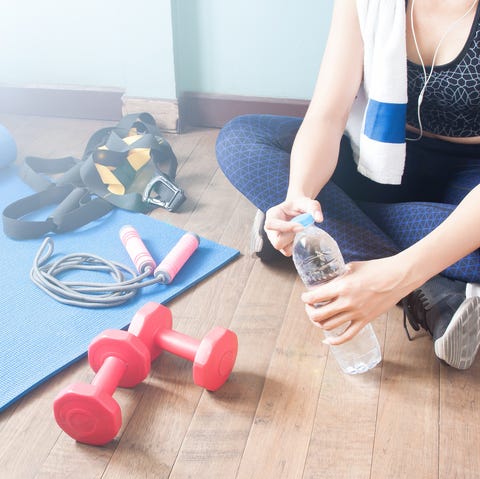
Honestly, pre-workout drinks sound kind of awesome: Down a drink before exercising, get a boost of energy from said drink, burn extra calories—and ultimately, lose more weight.
Not to mention your fit Instagram friend swears by them (cue all the pre-workout drink pics). But can these exercise-enhancing, weight-loss-boosting drinks actually do what they claim? And uh, should you even use them in the first place?
Hold on, what exactly are pre-workout drinks?
Pre-workout drinks (or “pre,” as many call it) are essentially supplements—usually sold either as powders or pre-mixed drinks—with ingredients meant to help enhance your workout when taken beforehand.
“The purpose of almost all pre- workouts is to increase energy, focus, and stamina levels, making it possibly easier for you to both crank through a workout and to give 100 percent at the workout,” says Pamela M. Nisevich Bede, R.D., nutrition consultant for Swim, Bike, Run, Eat and co-author of Run to Lose.

Bede says the most common ingredient is caffeine. “Caffeine is well-researched and known to increase focus, stamina, and reduce perceived exertion—a.k.a. make the workout feel easier,” she explains. “Nitrates are also common—they increase vasodilation, improving blood and oxygen flow to working muscles.”
The ingredient list could also include beta-alanine, an amino acid. “I view beta-alanine as an ingredient that allows for one more rep or one more sprint, effectively allowing you to get more from your workout,” Bede says.
Obviously, you’re meant to take these supplements before you start working out—not after. The idea is to take them 30 to 60 minutes prior to get the best (i.e., energy-boosting) results, says Torey Armul, R.D., a spokesperson for the Academy of Nutrition and Dietetics
Interesting…so can they help you lose weight?
The short answer is maybe. Because the blend of ingredients is meant to turn up your drive, you may work at a higher intensity during exercise, which burns more calories during the session, as well as afterward, says Carwyn Sharp, Ph.D., C.S.C.S., chief scientific officer for the National Strength and Conditioning Association.
Armul agrees: “Properly fueling a workout can help you lose weight,” she says. “That’s because having available glucose stores can prolong the intensity and duration of your workouts, both of which control calorie burns.”

While pre-workout drinks are relatively new and therefore haven’t been studied much, one 2018 review in the Journal of the International Society of Sports Nutrition found that pre-workout may help with muscular endurance (working stronger for longer) and continuous use did change people’s body composition by increasing lean body mass (which means less fat).
The catch: While these pre-workout drinks seem safe, they haven’t been studied over the long-term, so more research is needed to 100 percent say there are no real side effects.
In fact, Armul suggests fueling with real food rather than pre-workout (half a banana and a cup of coffee, for example, can provide most of the same stuff—and is more nutritious).
So, should I try pre-workout drinks…pre-workout?
In term’s of safety, you’re probably in the clear to try them out. But again, Armul says you’re likely better off with real foods as a snack about an hour before your workout. “A pre-workout mix can’t do anything that real food won’t do. And real food does it better,” she says
Fitness expert Chris Ryan, C.S.C.S., says traditional java offers the best bang for your buck. (He’s talking plain black coffee—nothing with added sugar or milk, which can negate any additional calorie burn.) Coffee can stimulate your metabolism and can help you run a bit faster (think shaving a few seconds off per mile) and lift a bit heavier. Aim for a small coffee and drink it 30 to 60 minutes before a workout to reap those small (but ultimately significant) gains.

Another thing to note: Like any supplement, pre-workout drinks are not regulated by the FDA so there’s no government body that checks the label or what’s inside. “Don’t believe everything you read, because the FDA does not regulate their marketing claims or their ingredients,” says Armul, who adds that they could even contain illegal substances in some situations. One red flag: The words “proprietary blend,” according to the previously referenced 2018 review—that term forces buyers to guess exactly what ingredients (and how much of them) they’re getting.

Also important: You can overdo it. “Too much of a good thing can also make you feel jittery, nervous, heart racing, or even ill,” says Bede. “[Supplements] don’t usually supply energy in the form of calories or carbs—the ‘energy’ comes from the stimulants. Most people should avoid consuming more than 400 milligrams of caffeine per day. If you have a caffeine sensitivity, it’s especially important for you to watch your intake or skip these altogether.
A smart strategy if you do want to try pre-workouts: “Start slow and read the label,” Bede says. “Grab a trusted brand and don’t take a full dose (or two or three) until you know how it may affect you.”
The bottom line: Pre-workout drinks might be able to boost your performance—possibly leading to weight loss—but no better than a nutritious snack before the gym would.
Source: Read Full Article
